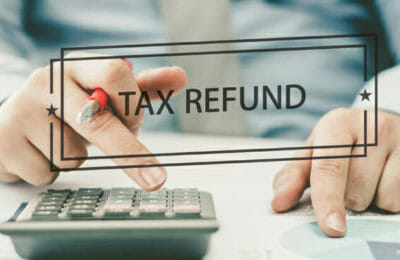Tax refund scams – make sure you don’t get caught out by the scammers
There’s little more satisfying than finding out that you’re due a sizeable tax refund. Except, of course, that it may just well be one of the many tax refund scams that are circulating at the moment.
After all, we work hard for our money and we spend our valuable time making sure our accounts are in order. It’s nice to think that the taxman looks at our returns, realises we’ve paid too much and immediately starts sorting out a repayment.
It does happen and when it does, you often find a nice cheque from HMRC arriving in your post.
However, the sad fact is that there are tax refund scams out there which use the promise of tax refunds to get hold of your bank details and steal your money.
They do this in a number of ways. They might ring you up and ask you for bank details and passwords, which they claim to need to process your ‘refund’. Sometimes they’ll email or text a web link, which will take you a bogus page designed to harvest your details.
Some of these communications are very professional and plausible, so the first you’ll know that you’ve been scammed is when you discover a big hole in your bank account.
If that’s not bad enough, there’s an even more unpleasant technique used by the fraudsters.
This is when they get in touch demanding you pay a bogus tax bill. Often done by phone, these calls can be very aggressive and the criminals may threaten you with being arrested or put in prison if you don’t pay up.
Is this refund or tax demand real?
So, how do you tell whether a call, text or email is really from HMRC and not a scammer?
Firstly, if you don’t normally fill in a tax return – normally because you are in employment – then any communication is likely to be a scam. Tax is normally deducted automatically from wages, pensions and savings. Only people who earn income that’s not taxed at source (e.g. self-employed income, rental income etc) will usually fill in a tax return.
If you do normally complete a Self Assessment Tax Return or VAT returns, then you will often receive legitimate communications from HMRC. If you get an email, the first thing you should do is check that it addresses you by your name (and not something like ‘Dear Taxpayer’) and that it is sent from an email address that ends in ‘hmrc.gov.uk’.
Next, you should never click on links in emails or texts that you weren’t expecting. Nor should you download any attachments.
Most importantly of all, you should NEVER EVER give out any information like your bank details, passwords or PIN numbers. HMRC will never ask for these (and neither will any bank). If you are asked for these details, put the phone down or ignore the email.
If in doubt….
Sometimes a communication can seem so plausible, yet you may still feel something’s not right. If that’s the case, don’t worry. Instead, ignore the email or text, or end the call and then get in touch with HMRC to check whether it’s genuine.
You can also forward suspicious texts to 60599 or forward suspect emails to phishing@hmrc.gov.uk.
Of course, if THP looks after your tax returns, you’re encouraged to forward any questionable tax communications to us. We’d be happy to advise you whether they are genuine and whether you need to take any further action.
About Karen Jones
Having worked for one of the world’s largest accountancy firms, Karen Jones uses her tax knowledge and skills to help clients obtain substantial reductions to their tax liabilities.
With an expanding portfolio of tax clients, Karen enjoys the variety her work brings her and particularly likes working with new businesses and people. With a growing number of tax clients, she frequently faces a variety of challenges and relishes the experience she gains as she solves them.
Karen likes the THP ethos: “I like the way the team has a professional, but friendly and down-to-earth approach – it creates a productive atmosphere that benefits everyone.”
Karen’s specialist skills:
- Personal Taxation
- Tax Efficient Planning
- Trust Administration












